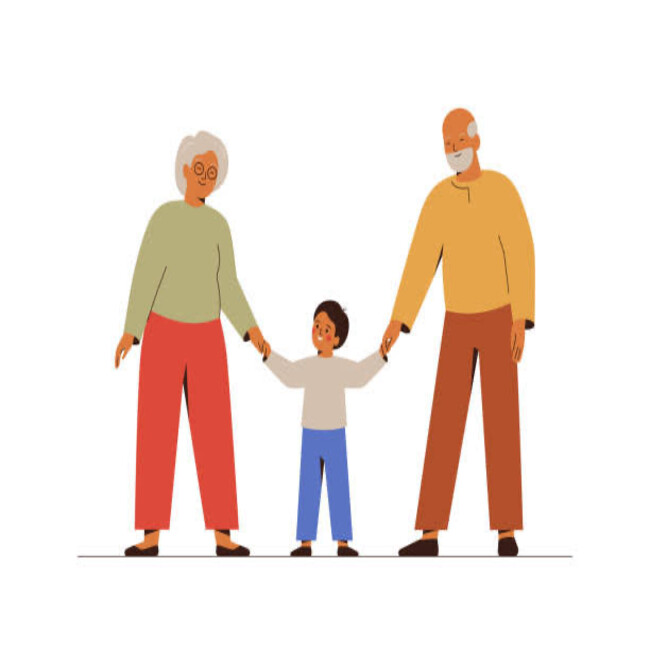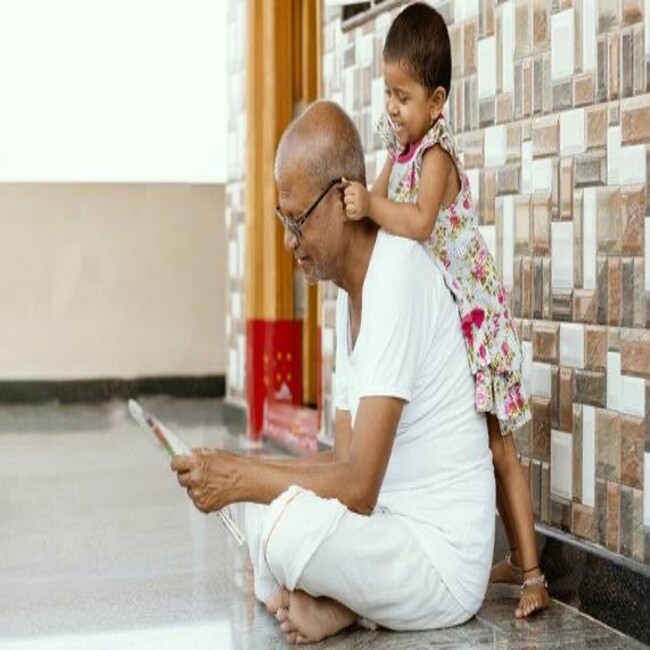The Quiet Grief of Childhood: On Grandparents, Loss, and Emotional Inheritance
In therapy/counselling rooms across the country, children often bring their grief quietly. They don’t always name it, but it lives in their drawings, in the pauses between their sentences, in the sudden drop in their gaze when they mention “Dadu used to say I could do anything” or “Nani would always wait for me with mangoes”.
What’s striking isn’t just the grief of loss …but the grief of not knowing how to grieve.
Many children who have lost a grandparent … especially one they were deeply attached to … carry a sorrow that feels both immense and oddly invisible. Their parents might walk them through the rituals, explain that “Nanu was very old” or even say “he had a good death”. But few pause to notice the scale of emotional rupture that a child might be experiencing.
To adults, the passing of an elderly grandparent is often seen as life coming full circle. Predictable. Peaceful. Palatable. But for children especially in India, where grandparents often serve as emotional anchors in joint or semi-joint families … this loss can feel monumental. Irretrievable. Like the sudden vanishing of someone who truly saw them.
Grandparents as Emotional Anchors - In many Indian families, especially those not entirely fragmented by urban migration or nuclear structuring, grandparents still hold an almost sacred place. Not always as disciplinarians or decision-makers but often as the soft landing, the warm lap, the one person in the household with time on their hands and belief in their hearts.
Unlike parents who are often overworked, stretched thin by ambition or survival …. grandparents exist in a different rhythm. Their love is less performative, more patient. Their pride in the child is often less conditional. They may not understand contemporary slang or syllabus structures, but they understand how to pause, how to listen, how to delight.
And for many children, especially those whose parents are emotionally unavailable or preoccupied, this grandparental bond becomes a lifeline. A relationship where they are not merely managed, but deeply cherished. When such a grandparent dies, it’s not just a familial loss it is the death of a profound emotional witness.
The Invisible Child-Mourner One of the lesser spoken truths in Indian families is how little space children are given to mourn. The rituals are usually for the adults conducted in whispers, dictated by caste customs, social obligations, and logistics. Children are often kept at the periphery, “protected” from the sadness, told to move on, distracted with schoolwork.
But children are watching. Listening. Feeling.
And sometimes, years later, he talks about how Dadi used to comb his hair every morning. Or how her Nanu said that she could be a writer one day. Or how nobody, ever since, has had that kind of time for him.and her.
As therapists, we must learn to attend to this kind of grief … the one that didn’t get the funeral it needed. The one that stayed quiet because the child didn’t yet have the words to say “I lost my safest person.”
When There Was No Bond: The Grief of Absence - Not all children are close to their grandparents. Many are raised in cities, with grandparents in distant towns or different continents. Some grow up in households where grandparents were emotionally harsh, or unavailable, or were never introduced at all.But even these children sometimes speak of a different ache …. the ache of absence. They see others talk fondly of their Nani’s laddoos or Dadu’s stories and are reminded of what they never had. Sometimes, in therapy, a child who has never met their grandfather may ask, “Would he have liked me?” or say, “I wish I had someone like that”. This too is grief …. a grief of unmet longing. Of imagined nurturance. And it deserves space.
East and West: A Cultural Contrast- In many Western contexts, the role of the grandparent is more optional, less central. Grandparents may live independently, interact occasionally, and are often not involved in daily caregiving. While love certainly exists, the emotional enmeshment we see in Indian families is rarer.
In contrast, Indian grandparents …especially in traditional households … are often co-parents in the truest sense. They drop children to school, feed them lunch, tell mythological stories, and sometimes offer the only stable emotional presence in a chaotic household. Their wisdom, their rituals, their oral histories … all of it becomes a kind of emotional inheritance.
So when they die, a cultural transmission dies with them. And the child knowingly or not mourns more than just the person. They mourn the storyteller, the protector, the believer.
The Need for New Rituals - As India continues to urbanise, with family systems shifting and distances growing, the traditional scaffolding of grandparent-grandchild intimacy is weakening. But where this bond still exists, it remains sacred and its loss must be honoured.We need new rituals for children not just the religious kind, but emotional ones. Perhaps memory books. Or storytelling circles. Or simply a space to say, “I miss them”. We need to teach families that children are not too young to grieve. They are simply too young to grieve alone.
At its core, this is not just a story about loss. It’s a story about emotional lineage and the quiet, powerful role grandparents play in shaping a child’s sense of worth.In a world that moves fast and expects children to move with it, perhaps it is the grandparents who teach them how to slow down. How to be. How to feel deeply. And when they’re gone, we owe it to the children to slow down too. To notice. To remember. And to mourn … not just what was, but what it meant.
Ms. Meghna Joshi
Psychodynamic Counsellor
The Indian School















